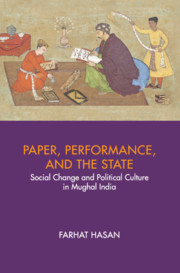Book contents
- Frontmatter
- Dedication
- Contents
- Acknowledgements
- List of Abbreviations
- A Note on Transliteration
- 1 Introduction
- 2 Property and Social Relations: Litigations and Disputes at the Qāzi's Court
- 3 Law as Contested Communication: Literacy, Performativity, and the Legal Order
- 4 Embodiment, Sensoriality, and the Public Sphere: Shifting Popular Perceptions of the State
- 5 State Formation from Below: Authority and Culture in Micro-Spaces
- 6 Towards a Conclusion: The Project of the Nation-State and the Mughal Historian
- Bibliography
- Index
1 - Introduction
Published online by Cambridge University Press: 07 August 2021
- Frontmatter
- Dedication
- Contents
- Acknowledgements
- List of Abbreviations
- A Note on Transliteration
- 1 Introduction
- 2 Property and Social Relations: Litigations and Disputes at the Qāzi's Court
- 3 Law as Contested Communication: Literacy, Performativity, and the Legal Order
- 4 Embodiment, Sensoriality, and the Public Sphere: Shifting Popular Perceptions of the State
- 5 State Formation from Below: Authority and Culture in Micro-Spaces
- 6 Towards a Conclusion: The Project of the Nation-State and the Mughal Historian
- Bibliography
- Index
Summary
This work is concerned with exploring the state in activity, and not (as is so often the case) as a set of institutions and structural attributes. Dispensing with the top-down perspectives that focus on the kings, high nobles and the bureaucracy, the harem and the imperial court, the effort here is to view state formation from below. A preliminary effort in this direction was made earlier in my work on western India during the sixteenth–eighteenth centuries where I had argued that the state–society relations were integral to Mughal state-formation, and the political process was marked by an interpenetration of social forces with the state. I was of course not the only one to have done so, and before and since my work, there have been several interesting studies that have examined the state from the bottom-up, and have provided fresh insights on political processes in the early modern period. Most of these studies, mine included, have looked at the malleability in the rule structure, and have, from their respective contexts, highlighted the extent to which the local power-holders, corporate groups, and common people participated, and modified, even restructured, the rule structure. In this work, I focus not so much on questions of how the society impinged on the state, but on how the state's relations with local power relations shaped the sociocultural processes in early modern South Asia. I examine the social constituents of the state, and see how state–society relations impinged on, and reproduced the legal order, local corporate bodies, forms of social communication and property transactions. In other words, the work explores the socially embedded attributes of the state, and the extent to which they shaped legal pluralism, literacy and oral traditions, identity politics, publicness and the public sphere, and property relations. In line with the state-in-society approach suggested by a growing number of political theorists and anthropologists, the primary aim here is to see how social life and cultural practices were constituted and reshaped by the state's participation in social spaces and, more importantly, its entangled relations with the elites and common people in micro-spaces. I have elsewhere described the rule structure as constituting the ‘state–society compact of authority’, and part of my aim is to see how the networks of these relations served to reproduce the sociocultural spaces in the Mughal period.
- Type
- Chapter
- Information
- Paper, Performance, and the StateSocial Change and Political Culture in Mughal India, pp. 1 - 12Publisher: Cambridge University PressPrint publication year: 2021



